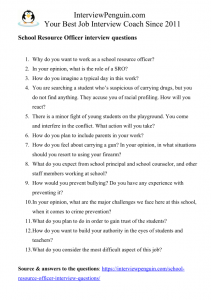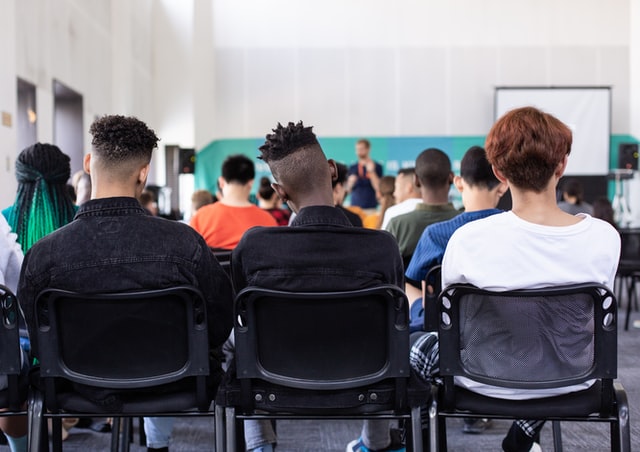Crime continues to be present at schools across the US and Canada, regardless of the racial make-up of the students. Almost 50% of school across the US employ at least one SRO, trying to mitigate and most importantly prevent the crime. You will earn more than most teachers and counselors in this job, but you will also carry a lot of responsibility on your shoulders.
School Resource Officers are responsible for more than just law enforcement, though they would hardly handle their job without their authority. You will educate students, you will be a sort of an informal counselor and mentor, and you will cooperate with School Principal and Mental Health Counselor as a part of a Threat Assessment Team.
We can never eliminate the crime from schools. But you can help to mitigate it, and minimize the number of incidents, with a good work you do in this job. Let’s have a look at the questions you may face while interviewing for this interesting position.
Table of Contents
Why do you want to work as a school resource officer?
SRO pays better than most police jobs. As you can guess though, you should not point out your salary while explaining the reasons of your choice. Try to refer to the meaningful purpose you see in this role. You are aware of the crime at schools, and the difficult position of teachers and administrators in trying to mitigate it without having the law enforcement authority.
Perhaps you are also a father (or plan to become one), and want a safer environment for children at schools. With your experience, authority, and motivation to actually change something–not only arresting, but also educating students, you hope to help create such an environment.
You can also say that with your excellent interpersonal and conflict resolution skills, you believe to be the right match for this job, to handle all the functions you’ll have as a school resource officer, and your cooperation with other bodies from school.
In your opinion, what is the role of a SRO?
The most important thing is to show a holistic approach to your role at school. You should not imagine walking around the corridors in your uniform, hand on your firearm, waiting to make the next arrest… On the contrary, you should place value on educational and mentoring part of this job.
You can either talk about particular duties, and explain your role in this way. For example educating in classes, participating in meetings with problematic students, helping to devise crime prevention strategies at school, etc. In a close cooperation with principal and counselors, you’ll try to make the school a safer place for everyone. Law enforcement and arresting someone should be only your last resort (though of course an important one).
Another way of answering the question is summarizing your goal, or your mission statement. You see a role of a SRO in helping to establish the safest possible environment at the given school. Not only for students, but for all stakeholders. That’s your goal, and all you do in the job should help you to eventually attain it.
* May also interest you: School Crossing Guard interview questions.
How do you imagine a typical day in this work?
Try to show realistic expectations, and mention a variety of duties. Patrolling the school grounds is what you will do while nothing happens, but of course things will happen.
You can say that you imagine intervening in conflicts, helping with physical searches, supervising school events, giving presentations on safety, drug and alcohol abuse, bullying, and other topics, taking part in the Threat Assessment Team and in other teams at school, and basically doing whatever the day requires, while you try to maintain the safe school environment for everyone.
Do not forget to speak with enthusiasm when explaining your idea of a typical day at school. The interviewers should get an impression that you are looking forward to doing the job, and do not apply just because you have to get some well-paid position.
You are searching a student who’s suspicious of carrying drugs, but you do not find anything. They accuse you of racial profiling. How will you react?
First of all, ensure the interviewers that you have no prejudice when it comes to people of different races or colors. You will focus on proofs (such as pictures from surveillance cameras, hints from your informers, and of course your observation skills), and not on the race or religion of the students.
But these things can still happen. You can say that you will apologize to the student–if you do not find any illegal substances. And you can also say that you will simply ensure them that your choice has nothing to do with their race. You simply spotted something, or got some information, and decided to search them. You’d do the same thing with any other student in the given circumstances.
Ensure the interviewers that you count with being blamed for racial profiling and other things. It simply belongs to the job of a police officer, and it won’t discourage you to continue trying your best.
* May also interest you: Security Guard interview questions.
There is a minor fight of young students on the playground. You come and interfere in the conflict. What action will you take?
This is a question of your attitude. Will you just stop the fight, scorn the students, and take them to principal’s office by force?
Or will you try to investigate on the reasons of the conflict, possibly educate the conflict parties, and maybe ask them to shake hands and perhaps even let them leave the place, without taking the disciplinary action?
Try to show the hiring committee that you see your role as a mentor, educator, and counselor also. You aren’t just a law enforcement officer, and you can approach situations sensitively, not necessarily arresting everyone and making a fuzz of a small innocent fight of second grade students. Of course, if it wasn’t innocent, and your attempt to educate them failed, you would take them to the principal’s office, and take necessary measures.
Special Tip: You can download the list of questions in a one page long PDF, print it, and practice your interview answers anytime later:

How do you plan to include parents in your work?
At the end of the day, parents are the first tole models of children. They also have an authority, and if we talk about elementary school, they bear the legal responsibility in many ways. Hence you should not ignore them in your work.
Now, it is mostly the role of a principal or counselor to contact the parents and talk about the behavior of their child. But you should not restrain from participating in these meetings. Cooperating parent, who tries to educate their child to restrain from criminal activity, can make your job much easier.
You are aware of that, and will try your best to gain the trust of the parents, and to involve them in the process of making the school a safer place for their children, and for everyone else. You can even suggest giving a presentation on crime prevention in front of the parents, helping them to understand their role in the process, gaining their trust.
Other questions you may face while interviewing for a job of a School Resource Officer
- How do you feel about carrying a gun? In your opinion, in what situations should you resort to using your firearm?
- What do you expect from school principal and school counselor, and other staff members working at school?
- How would you prevent bullying? Do you have any experience with preventing it?
- In your opinion, what are the major challenges we face here at this school, when it comes to crime prevention?
- What do you plan to do in order to gain trust of the students?
- How do you want to build your authority in the eyes of students and teachers?
- What do you consider the most difficult aspect of this job?
Conclusion, next steps
Interview for a job of a school resource officer belongs to interviews with average difficulty. This is a specialty position, no fancy job title, and you typically won’t compete with many other people for the position. That makes your situation easier.
On the other hand, you may often interview in front of a panel, consisting of both police and school representatives. This can be quite stressful. What’s more, different bodies in the interviewing panel may have different expectations when it come to your work. Hence it can be tricky to satisfy all of them with your answers.
But you should not get discouraged. Try to learn as much as you can about your future place of work, and prepare an answer to each question from our list. Speak with enthusiasm, and always put emphasis on all roles you will have as a school resource officer, including the role of an educator and mentor. If you manage to do it, you will succeed. I wish you good luck!
May also interest you:
- How to overcome interview nerves – Feeling stressed before the start of your interview? Learn how to overcome your nerves and show your very best on the big day.
- School bus driver interview questions.
- School nurse interview questions.

